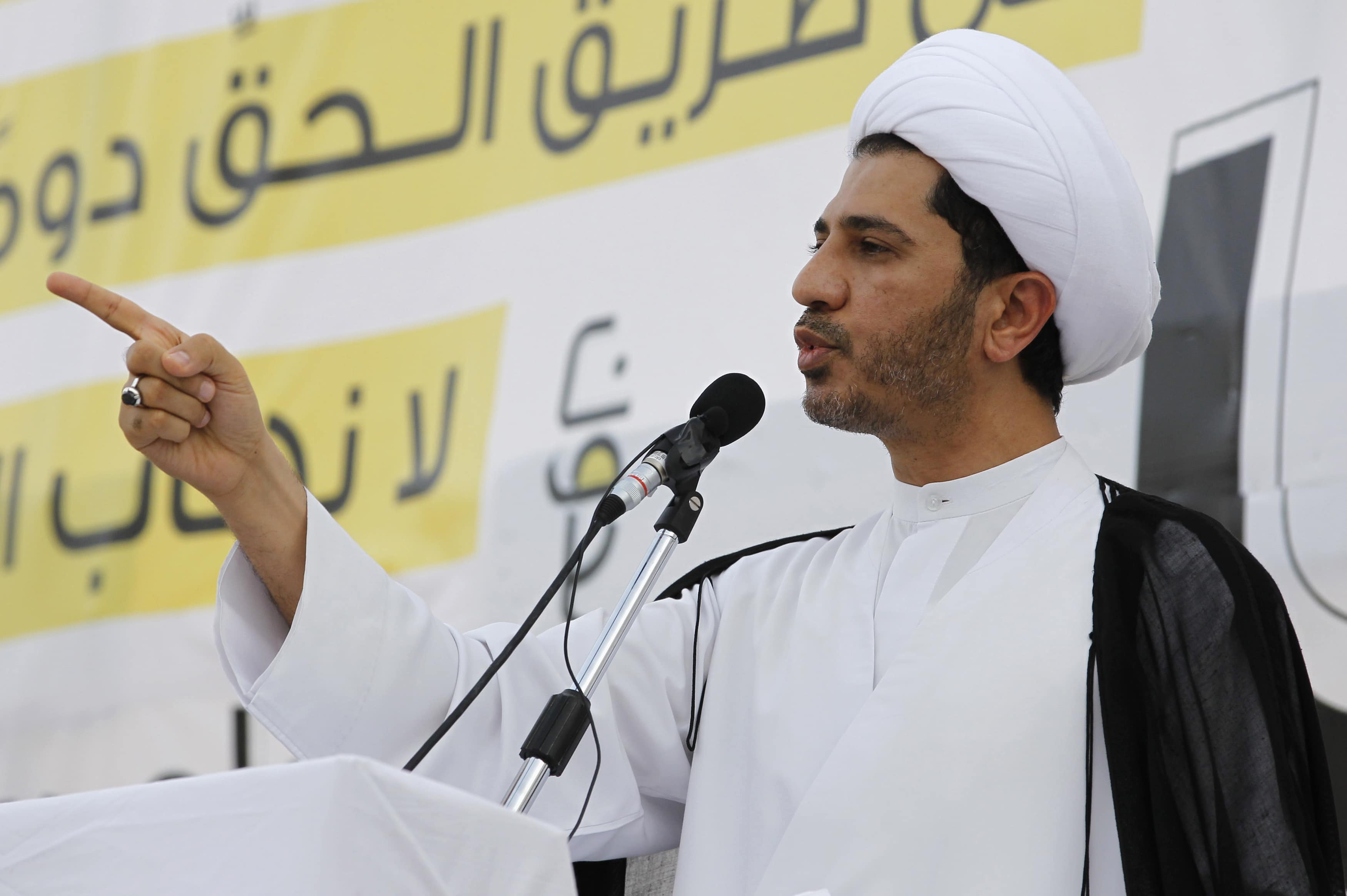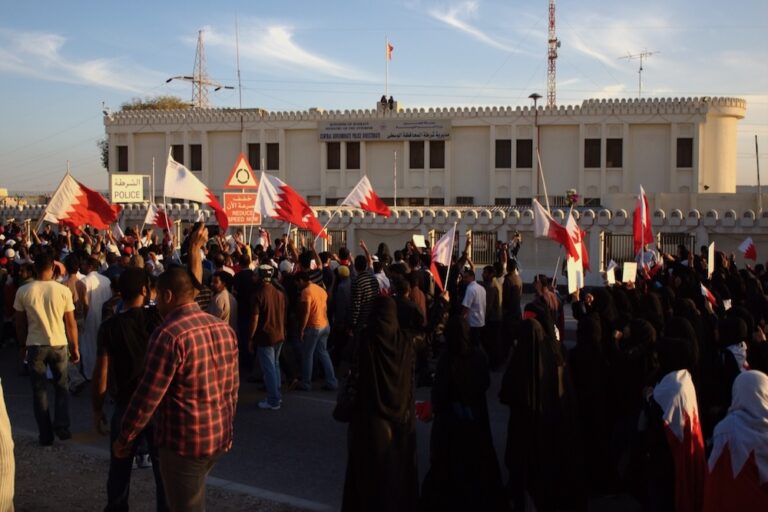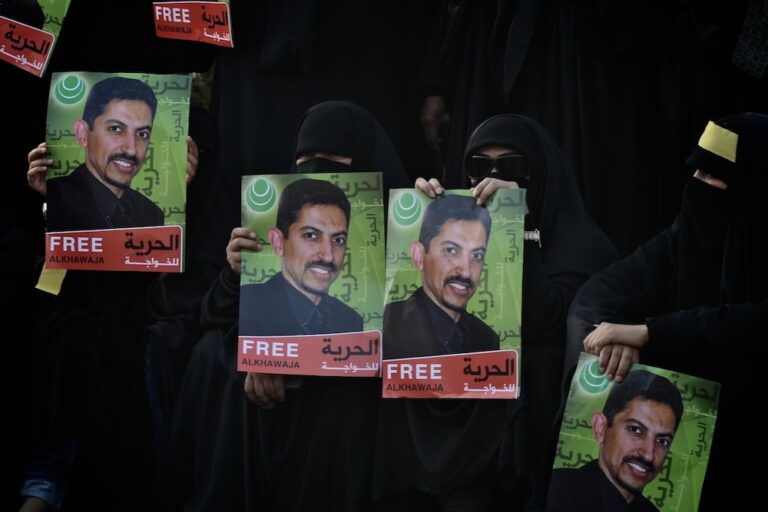For the second time in less than two months, the Prosecution interrogates Al-Wefaq’s Secretary-General Shiekh Ali Salman on charges of insulting the authority in Bahrain.
The Bahrain Center for Human Rights (BCHR) condemns the authority’s continuous restriction of peaceful political work and the targeting of opposition figures with the intent of deterring them from demanding freedom and democracy.
The General Directorate of Criminal Investigations and Forensic Evidence summoned the Secretary-General of Al-Wefaq National Islamic Society Sheikh Ali Salman for an urgent interrogation.
This is the second time in less than two months that Salman is interrogated.
Sheikh Ali Salman’s lawyer Abdullah Al-Shamlawi mentioned on his official account on the social media network Twitter that the Criminal Investigation Department interrogated Sheikh Ali Salman on 28 December 2013 regarding the speech he delivered the day before.
Salman was then sent to the Public Prosecution, and after having spent more than six hours there, the prosecution decided to release him ensuring his place of residence and banning him from travel, after charging him with “publicly inciting the hatred of a sect of people, and spreading false news knowing that it is likely to harm national security and public order”.
Sheikh Ali Salman had delivered his speech in the Imam Al-Sadiq Mosque in Qufool at noon on 27 December. He emphasized the legitimacy of the demands of the Bahraini people and the necessity to continue peaceful work to obtain the people’s rights.
However, whilst giving his speech, the Ministry of Interior announced through its official account on Twitter that Salman is being summoned for questioning in regards to the sectarian language that it claimed was included in his speech.
The Ministry of Interior added that Salman’s speech contained incitement against the ruling regime alleging that it caused a breakdown in security and a rise in unlawful acts. The summoning of Sheikh Ali Salman comes two days after Bahraini ruler Hamad Al-Khalifa’s visit to the Ministry of Interior, whereby he thanked the security forces for the work they carry out.
On 28 December 2013, dozens of citizens who were protesting Salman’s arrest in front of his house were abused by security forces clamping down. More than seven citizens were arrested, five of whom were released. The two citizens remaining were presented to the Public Prosecution on 29 December 2013.
Among those detained was Al-Wefaq’s former MP Abdul-Majeed Al-Sebea. He was arrested while attempting to prevent the security forces from suppressing the gathering in front Salman’s house. The forces also cracked down on a number of peaceful demonstrations that were carried out in a few villages and cities across Bahrain demanding Salman’s release, and an end to the targeting of the opposition leaders.
In the first statement after his release, Sheikh Ali Salman said that the authority had been monitoring his phone and are aware of his intention to travel in two weeks on a tour to visit some European countries to raise awareness about the reality of the situation in Bahrain.
This is not the first time that Sheikh Ali Salman is targeted; he had been summoned for interrogation several times before, the last of which was on 3 November 2013 where he was also charged with “insulting a governmental body” based on an art exhibit that Al-Wefaq National Society held at its center to display the peaceful revolution in Bahrain and portray the Ministry of Interior’s many violations.
Before that, Sheikh Ali Salman was summoned to a military court during the state emergency period. Salman’s arrest falls within the context of the suppressive campaign led by the authority against peaceful political opposition. The security forces had arrested Salman’s political assistant in the society Khalil Al-Marzooq for a month, and interrogated him on a charge within the terrorism law. He was released a while later.
There are still 13 opposition figures detained since March 2013 in the case known as “Coalition for the Republic”; they have been sentenced to prison to periods that vary between five years’ imprisonment and life sentences, after accusing them of seeking to overthrow the regime by force. Among those detainees is the former president of BCHR Abdulhadi Al-Khawaja.
Human Rights Watch indicated in a report that was published earlier the great discrepancy in the measures taken against the leaders and the clear corruption in the judicial body. The Ministry of Justice and Islamic Affairs is waging an open war against civil society institutions, especially the opposition political societies.
It had recently dissolved the opposition Islamic Action Society (Amal) to limit its political activity.
The Bahraini court is currently looking into a lawsuit filed by the Ministry of Justice against the Olamaa Islamic Council, and the final decision will be made on 29 January 2014.
Vice President of BCHR Sayed Yousif Al-Muhafdha said that the Bahraini judicial bodies, including the Public Prosecution, are tools used by the authority to suppress the opposition.
While the security forces step up to prosecute Shiite preachers and opposition, they turn a blind eye to some of the preachers who openly speak about cursing the largest component of society [Shiites] calling for their elimination and murder.
“BCHR had previously released a report that addresses the bias of judicial bodies and the Public Prosecution and their involvement with the Criminal Investigation in forcing detainees to confess to fabricated and malicious charges,” said Al-Muhafdha.
Targeting the opposition is a clear violation of Article 22 of the International Covenant on Civil and Political Rights related to freedom of establishing societies and peaceful gatherings, as well as Article 19 of the Universal Declaration of Human Rights concerned with maintaining freedom of opinion and expression, he added.
Based on the above, BCHR calls on the United States, United Kingdom, United Nations and all the close allies of the Bahraini authority and relevant international organizations to:
- Put pressure on the authority in Bahrain to take into consideration and maintain human rights especially those related to freedom of expression and peaceful political work;
- Try Bahrain internationally for its continuous and repetitive violations of the Universal Declaration of Human Rights and the International Covenant on Civil and Political Rights which it had endorsed;
It also calls on the authority in Bahrain to:
- Drop all charges against Sheikh Ali Salman, Secretary-General of Al-Wefaq National Islamic Society;
- Immediately release all the prisoners of conscience, especially the opposition leaders;
- Stop targeting and prosecuting the opposition and the human rights activists due to their peaceful activities;
- Hold accountable and question all those involved in the violations and torture;
- Drop all charges related to freedom of expression in the ongoing trials.



